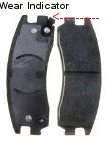There are different kinds of front brake problems that drivers might experience. Model specific ones that are recognized by the Manufacturer can even generate technical service bulletins. Unfortunately, these are sent to dealership level technicians and not shared with the car owners or even their personal mechanics.
One of the most common complaints people deal with is excessive brake noise. The driver’s description of the problem is what gives the mechanic a direction to go in. Being able to analyze the situation and describe your problem to the auto repair shop can save time and might save money in the long run.

Being able to accurately describe the problem with your brakes may also be extremely helpful in getting your automobile fixed right the first time. This is even more important when it comes to brake noise.
Often miss communication between the driver and the mechanic can cause extended repair time and having things repaired that have nothing to do with the original complaint. Most auto repair shops have a service writer that gets in between the customer and the mechanic.
The idea is that the service writer translates the drivers information into an accurate technical description for the mechanic. Often things can get lost in translation. Make sure you carefully Read the auto repair order before you sign it to make sure that your description is accurate.
Types of Front Brake Problems
One common complaint would be a spongy pedal. When this gets real bad the customer will probably feel the need to pump the brakes to get a good stopping ability. The complaint may also be described as a soft-pedal.
A lot of times a soft or spongy brake pedal is associated with air that has gotten into the hydraulic braking system. On the opposite side of this equation would be a driver complaint of a hard pedal.
To the driver it may feel like the power brakes are not working properly. This can be caused by a problem with the power brake booster but it can also be caused by restrictions in the hydraulic system that restricts flow to the individual calipers. Keep in mind that when a caliper seizes this can also cause poor stopping and a hard pedal.
Sometimes the driver will complain about brake drag. Dragging brakes can make the vehicle feel as if it has lost power as it is driving down the road. Often a driver complaint of poor fuel economy or lack of power depending on how severe the brake drag is.
This feeling of dragging brakes is very similar to if you pulled away with the emergency brake applied. A brake pull to the left or right only when braking is usually traced back to problems with front calipers. However, there are other things on the car that can cause this pull. As the front end dips the alignment angles and weight distribution changes.
Two other things to check for is proper tire inflation and the condition of the tread itself. A vehicle will pull to the side that has the least amount of air pressure in the tire. Also the steering and suspension system can cause a pulling. Both of these issues can be exaggerated by hard braking as the front end compresses and this applies more load on both the front tires and the steering and suspension system.
Describing Brake Noise Problems

Another common condition would be brake noise. This can be frustrating for a mechanic to nail down. Often these kinds of noises can be intermittent. Notify the repair center if the brake noise is more apparent when the car is hot or cold.
Tell them if the sound happens all the time or is highly intermittent. Your observations are important to getting the problem solved. Most front brake pads have a wear indicator mounted on them that will generate a high pitched noise. This sound will usually disappear when the brakes are applied. If this is your condition describe it that way.
Just saying that your brakes are noisy can lead to a lot of wasted time and a car that might have to return to the shop again. Some front brake problems will not fall into any of the above categories. In this situation a road test is highly recommended with either the service writer or the mechanic. Pointing out the exact problem or condition takes a lot of guesswork out and can help get a vehicle fixed right the first time.
Share this page with drivers having brake problems.
Interested in learning more about car brakes? This next link takes you to the main page where you can find more articles about car disc brakes.
Here is a story about a technical service bulletin on ford vehicles that turns on the ABS light. This is actually one of a few front brake problems that can turn on a warning light.
The homepage is a great page to read to discover what other kinds of auto repair information is available here. You can also find out how to ask Diy car repair questions.

